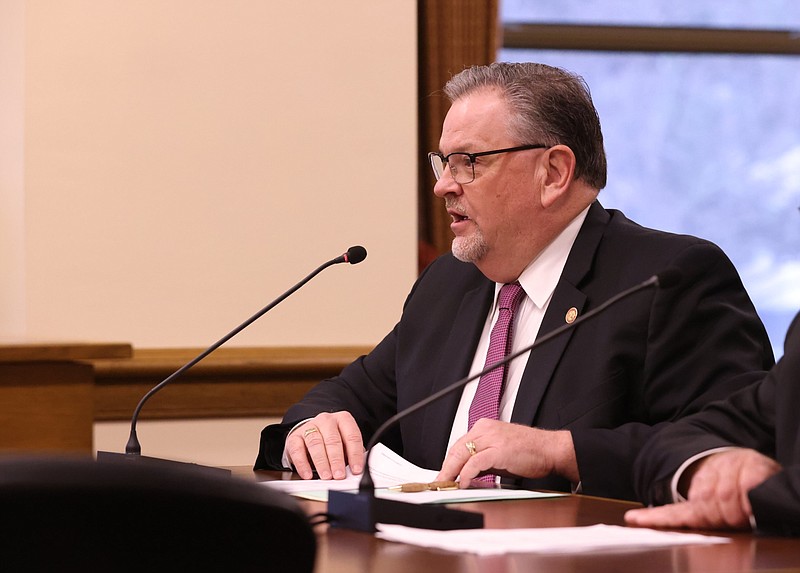The House Education Committee advanced a plan Thursday to increase public education funding by $75 million for the next fiscal year, which includes a cost-of-living adjustment for teachers and raises for school staff.
House Bill 1688, sponsored by House Education Chair Brian Evans, would fund public education for the next two years in the state's funding matrix, a complex formula for how the state spends money on schools.
The bill passed unanimously on a voice vote and moves to the House of Representatives for further consideration.
The legislation calls for a 2.8% increase in the per-pupil foundation funding to $7,618 for the 2023-2024 school year and to $7,771 for the 2024-2025 school year. Per-pupil funding for the 2022-2023 school year is $7,413.
"There's been a lot of things that have changed, there's been a lot of improvement. This is a large increase as far as funding," said Rep. Rick Beck, R-Center Ridge.
The bill provides school districts with funding for a $2-an-hour increase for classified full-time staff, which includes custodians, bus drivers, nurses and special education paraprofessionals. School districts also will receive funding to provide teachers and secretaries with a 1.8% cost-of-living adjustment in fiscal year 2024 and a 2.2% increase in fiscal year 2025, according to Evans.
The bill is part of a mandated process in which lawmakers review education adequacy and determine how much the state will spend on public schools for the next two years. The per-student foundation funding is the largest part of state funding for public education. Schools also receive supplemental state and federal funds for education.
Some members of the Education Committee said they reluctantly voted for the bill, saying they were disappointed to see that the proposed funding for public schools is less than the $8,129 per-pupil amount recommended by the House Education Committee and the $8,150 recommended by the Senate Education Committee in November for the total foundation funding rate for the 2023-2024 school year.
"I feel like I don't have a choice but to vote for this because the schools need funding, but I do not feel like this is what our schools were expecting," said Rep. DeAnn Vaught, R-Horatio.
The bill is a part process that takes place every two years where lawmakers establish a funding formula for public education, also known as the adequacy process. Public education is funded through a matrix that breaks down how schools should spend the per-pupil funding. School districts have wide discretion in how they can spend state dollars.
Evans' bill, which is the result of weeks of discussion, raises education funding by $75 million in fiscal year 2024 and by $132 million in fiscal year 2025, according to an estimate from the Arkansas Department of Education.
"The Governor is proud of the historic investments in education she and the legislature worked on together to deliver this session," Alexa Henning, a spokeswoman for Gov. Sarah Huckabee Sanders, said in a statement last week. "Arkansas LEARNS and the increase in foundation funding show the Governor and legislature's commitment to improving education in Arkansas through bold and conservative reforms."
Rep. Stetson Painter, R-Mountain Home, echoed Vaught's sentiments, saying the difference in what lawmakers proposed in November and what Evans presented to the committee Thursday "sent a shock wave throughout my district."
"I think a lot of people had a number off of the stuff that we mentioned, out of the adequacy [process], they got those numbers stuck in their head," he said. "And when we presented this, it's completely different."
Evans said the funding is less than what the committee recommended in November in part because of the LEARNS Act, Sanders' education overhaul. A large chunk of the increase was from the $4,000 raises for teachers the House Education Committee recommended in the fall.
Instead, teacher raises will be funded mostly through the LEARNS Act, which calls for the starting annual salary for teachers to increase from $36,000 to $50,000 and $2,000 raises for teachers making above the minimum. Additionally, Evans' proposal calls for state funding for school districts with a high percentage of students in a free and reduced lunch program, also known as Enhanced Student Achievement funding, to remain flat, given the additional money schools will get through the LEARNS Act, he said.
Funding for schools' contributions to employees' health insurance plans is also less than what lawmakers recommended in the fall based on the fund's solvency level.
"The need to increase that for the next two years, based on what the consultants had told us, currently is not needed today," Evans said.
IMPACT ON THE LEARNS ACT
The per-pupil foundation funding lawmakers approve this session will be used as the basis of the voucher program, also known as Educational Freedom Accounts, under the LEARNS Act.
Sanders' education overhaul would allow students to use 90% of the per-pupil foundation funding for public schools to attend a private or home school.
If Evans' bill becomes law, students would receive $6,856 to attend a private or home school for the 2023-2024 school year and $6,994 for the 2024-2025 school year.
Vouchers from the LEARNS Act will be phased in over three years beginning with the 2023-2024 school year, creating a tiered priority list for students. For that school year, students who are enrolled at F-rated schools; who are enrolled in kindergarten; who were or are in a foster care program; who have a disability; or who have an active-duty military parent will be given priority for Educational Freedom Accounts.
For the 2024-2025 school year, students who are enrolled in a D-rated school; who have a parent who is a military veteran; or who are children of first-responders may receive a voucher.
By the 2025-2026 school year, each student who is eligible to enroll in a public school will be eligible for a voucher to attend a private or home school.
